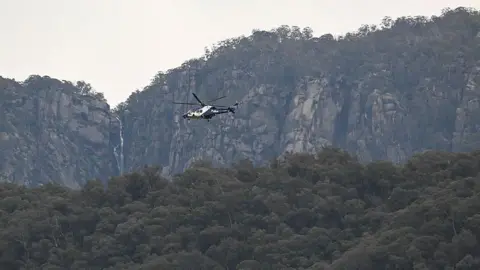Even in Australia, Porepunkah is a town few would have heard of before this week. Fewer still could pronounce it.
Nestled at the base of densely wooded mountains in the Australian Alps, it is home to about 1,000 people and beloved for its wineries, bushwalking and peaceful atmosphere – something which has now been shattered.
Choppers whir overhead. Kevlar-clad officers methodically patrol the town. Armoured vehicles roll down its streets. Porepunkah is now the centre of a massive manhunt for a heavily-armed man that police allege murdered two of their own in cold blood.
Officers went to Dezi Freeman's property on the outskirts of the rural Victorian town on Tuesday, with a warrant to search it. They were met with gunfire, before their alleged attacker – a 'sovereign citizen' with a well-documented hatred of authority – vanished into nearby bushland.
The shooting – which appears hauntingly similar to an ambush of police in Queensland three years ago – has shocked the town and revived questions over how the country deals with growing sects of anti-government conspiracy theorists.
Police were clearly expecting that this wasn't going to be a straightforward interaction. A detailed risk assessment had been conducted and 10 officers – a show of force – were tasked with executing the search warrant, reportedly relating to a sex crimes investigation.
Among them was a local detective from a nearby town who was on the brink of retirement. Neal Thompson was selected for the job because he'd had previous dealings with the target and was thought to have built rapport with him. Within minutes of arriving at the property, he was shot dead, alongside Senior Constable Vadim De Waart. Another unnamed officer was gravely injured and is recovering in hospital.
Mr Freeman escaped into thick tree cover on his property with several firearms, including, according to local media, an illegal homemade gun and at least one weapon stolen from the slain officers. He remains on the run.
As the residents of Porepunkah communicate their shock and fear, questions about the influence and danger posed by groups of individuals who reject government authority grow louder. While the vast majority of pseudo-law believers never resort to violence, the environment they create becomes fertile ground for extreme actions, warning experts of potential future incidents.
Authorities in Australia report increasing awareness of the persistent threats posed by these groups, emphasizing the need for better understanding and multi-sector responses to address the rising wave of anti-authoritarian sentiments that have emerged during the pandemic.






















